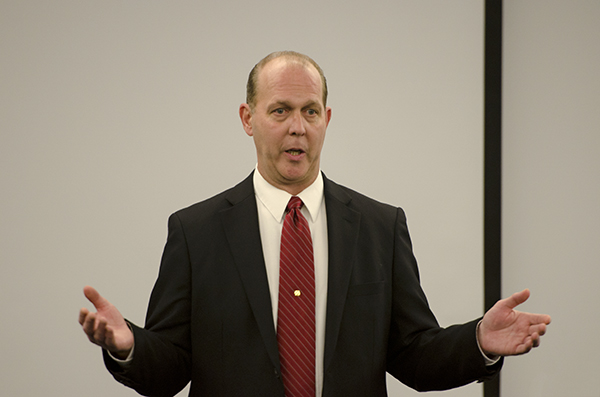
On Wednesday, Oct. 3, Campus Auxiliary Services (CAS) and the campus bookstore company Neebo (formerly known as Validis) held an open forum to discuss problems with the bookstore, including a shortage of textbooks, delayed shipping and disorganized shelving arrangements.
About 15 people, including faculty, staff and two students attended the forum.
Executive Director CAS Steven Deutsch, requested the forum that was conducted by Neebo’s new District Manager, Garrett Barton.
Deutsch said he requested the event to allow students, faculty and the campus bookstore to communicate, as well as to encourage a tangible new direction for the bookstore.
“I want everybody to feel as though they have been heard,” Deutsch said. “I’d like some clear commitments from the bookstore company and a plan from them going forward.”
He said CAS used to run the campus bookstore, as well as other campus services, internally for decades, but a growing trend in the outsourcing of certain services on college campuses prompted CAS to begin working with outside bookstore companies.
Neebo has a five-year contract with New Paltz and has been running the bookstore for two and half years.
Both Deutsch and Barton said there are a number of circumstantial problems that have contributed to recent difficulties, such as the opening and closing of Mando Books, the departures of store managers and issues with the submission of book orders by professors.
Deutsch also said the renovation of the Student Union and the flooding from Hurricane Irene were sources of problems in the past, but all of the blame cannot be put on this.
“It’s still imperative for the bookstore to do their job,” Deutsch said. “What should be clear is that Validis owns up to their mistakes…and that they’re addressing systemic issues.”
At the forum, Barton stressed two key ways to improve bookstore performance. He said first that the bookstore will “go 100 percent” for the upcoming spring and fall semesters by having a book on the shelves for each seat in each class, rather than make estimations based on student use of online and other sellers. The other is for professors and the bookstore to communicate better during the ordering process.
Barton emphasized the responsibility of the professors to place their orders well in advance.
“The sooner we get the information, the better prepared we can be. The cheaper the books are going to be, the better buyback prices the students are going to get, too, and everybody wins then,” he said. “Now, I can’t speak, again, for what happened this past semester, I can only tell you what’s going to happen in the future.”
Samantha Montagna, a fourth-year English major who transferred last semester, said her first experience with the bookstore is going to be her last.
“This is the first year I even used the bookstore,” Montagna said. “I transferred to New Paltz last semester, and usually rely on Amazon. I decided to order from the bookstore figuring it would be faster than Amazon. I will not be using the bookstore again. It is cheaper to order online anyway, with less frustration.”
Jessie Heine, a fourth-year English major and former employee of Mando books, said that both the closing of Mando and her three-year boycott of the campus bookstore led her to deal exclusively with private sellers online.
Heine said she had a lot of problems obtaining her books this semester, citing the ineptitude of USPS and recent tropical storms while also acknowledging issues that come with transitioning to online purchases.
“I think another reason I had so much trouble is because students all over the country are wising up to the overpriced nature of their local campus bookstores,” Heine said.
Toward the end of the forum, Deutsch discussed how he saw the future of the bookstore industry during the rebidding process that led to Neebo’s contract two and a half years ago.
“It’s the wild west,” Deutsch said. “You know, it’s changing so fast. The leaders, the devices are changing so quickly…the way consumers consume is changing every year.”

